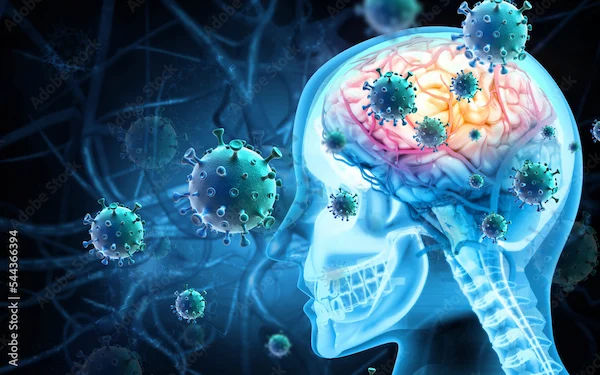Understanding Encephalitis: What You Need to Know
Learn about encephalitis, its causes, symptoms, treatment, and prevention. Find out how to recognise and manage this serious brain inflammation.

Written by Dr.Sonia Bhatt
Last updated on 3rd Jul, 2025

Introduction
Encephalitis is a potentially serious condition that causes inflammation of the brain, and while it is rare, it can be life-threatening if not properly treated. If you or someone you know has been diagnosed with encephalitis, it’s important to understand the causes, symptoms, treatment options, and preventive measures. This article will provide a thorough yet accessible overview of encephalitis, helping you make informed decisions about your health and care.
What is Encephalitis?
Encephalitis refers to inflammation of the brain, typically caused by viral infections, although other factors such as bacteria, autoimmune conditions, and certain drugs can also contribute. The inflammation disrupts normal brain function, potentially leading to a range of symptoms that can vary in severity. Encephalitis can be mild or severe, or even be fatal. If the symptoms worsen rapidly, It require prompt medical attention immediately.
Causes of Encephalitis
Encephalitis is generally caused by infections due to a variety of pathogens. The main causes include:
1. Viral Infections
Viruses are the leading cause of encephalitis, with a number of different types linked to the disease. Some of the most common viruses associated with encephalitis include:
Herpes Simplex Virus (HSV): The most frequent cause of viral encephalitis, HSV type 1 typically affects adults, whereas HSV type 2 can cause encephalitis in newborns.
Enteroviruses: These viruses are widespread and are often responsible for encephalitis, particularly in children.
Arboviruses: These include viruses like the West Nile virus and Zika virus, which are spread by mosquitoes.
Varicella-Zoster Virus (VZV): The same virus that causes chickenpox can also cause encephalitis, especially in older adults.
2. Autoimmune Encephalitis
In autoimmune encephalitis, the body’s immune system mistakenly attacks the brain. This condition is less common but can be just as serious. Autoimmune encephalitis is often triggered by infections or cancer, and it can cause psychiatric symptoms as well as neurological problems.
3. Bacterial Infections
While viral causes are more common, bacterial infections can also lead to encephalitis. Meningitis, an infection of the protective membranes surrounding the brain and spinal cord, can spread to the brain and cause encephalitis.
4. Fungal and Parasitic Infections
In rare cases, fungal or parasitic infections can also lead to encephalitis, particularly in individuals with weakened immune systems, such as those undergoing chemotherapy or living with HIV/AIDS.
Symptoms of Encephalitis
The symptoms of encephalitis can vary widely. Symptoms depend on the severity of the inflammation and the area of the brain that is affected. Common symptoms to look out for include:
Fever: One of the first signs, often accompanied by flu-like symptoms.
Headache: A severe or persistent headache is common.
Seizures: Uncontrolled shaking or convulsions may occur.
Confusion or Disorientation: Mental confusion or difficulty concentrating is often seen.
Memory Problems: Short-term memory issues or amnesia can be present.
Sensory Changes: Sensitivity to light or sound or blurred vision.
Speech and Movement Problems: Difficulty speaking or moving normally.
Fatigue or Drowsiness: A general sense of tiredness or lethargy.
In severe cases, encephalitis can cause coma or even death. If you or someone you know experiences sudden changes in behaviour, confusion, or loss of consciousness, seek immediate medical attention.
Diagnosing Encephalitis
A healthcare professional will begin by asking about symptoms and conducting a thorough physical and neurological examination. Since the symptoms of encephalitis can overlap with other conditions, further diagnostic tests may be required. These tests can include:
Blood Tests: To detect infections or abnormal immune responses.
CT or MRI Scans: To check for inflammation or damage in the brain.
Lumbar Puncture (Spinal Tap): A sample of cerebrospinal fluid is taken to test for infections and inflammatory markers.
EEG (Electroencephalogram): To measure electrical activity in the brain, which can help diagnose seizures or brain dysfunction.
Treatment for Encephalitis
The treatment of encephalitis depends on the underlying cause of the condition. In most cases, early intervention can improve outcomes and reduce the risk of complications. Treatment options include:
Antiviral Medications: If the encephalitis is caused by a viral infection, antiviral medications such as Acyclovir may be used. This is particularly effective for herpes simplex virus (HSV) encephalitis.
Steroids: For autoimmune encephalitis or other cases where the inflammation is a result of an immune response, corticosteroids may be prescribed to reduce brain swelling.
Antibiotics and Antifungal Treatments: If a bacterial or fungal infection is causing encephalitis, doctors will treat the patient with antibiotics or antifungal medicines to tackle the infection.
Supportive Care: For most cases of encephalitis, supportive care is key. This means making sure the patient gets plenty of rest, stays hydrated, and has any pain managed. In more severe cases, the patient may need to be admitted to a hospital for close monitoring and possibly intensive care, especially if they’re having seizures or need help with breathing.
Rehabilitation: If encephalitis leads to ongoing issues like memory problems, difficulty moving, or trouble speaking, rehabilitation therapies can help. These may include physical therapy to improve movement, speech therapy to help with communication, and occupational therapy to support daily activities.
Preventing Encephalitis
While it’s not always possible to prevent encephalitis, there are some steps you can take to reduce your risk:
Vaccination: Vaccines for diseases like measles, mumps, and rubella (MMR vaccine), and Japanese encephalitis, can help prevent certain viral infections that cause encephalitis.
Mosquito Protection: Using insect repellent, wearing long sleeves and trousers, and sleeping under nets can protect against mosquito-borne viruses such as West Nile virus.
Good Hygiene Practices: Regular handwashing, avoiding close contact with people who have viral infections, and taking precautions during flu seasons can help reduce the spread of infections that might lead to encephalitis.
Living with Encephalitis
If you or a loved one has been diagnosed with encephalitis, it’s important to have a strong support network. The recovery process can be long and challenging, but with the right medical care, therapy, and emotional support, many people can make significant progress.
Key steps for recovery include:
Follow up with your healthcare provider for ongoing check-ups.
Engaging in rehabilitation therapies as prescribed.
Staying informed and proactive about any changes in symptoms or new developments.
Seeking emotional and mental health support, as recovery can be stressful.
Conclusion
Encephalitis is a serious condition, but with early diagnosis and treatment, many individuals can recover or manage the symptoms effectively. If you notice any of the warning signs, such as fever, headache, confusion, or seizures, don’t hesitate to seek medical help. The quicker the condition is diagnosed, the better the chances of a positive outcome. By staying informed about encephalitis and working with your healthcare team, you can take an active role in managing your health.
Consult Top Neurologists
Consult Top Neurologists

Dr. Uddalak Chakraborty
Neurologist
8 Years • MBBS, MD(GENL.MED.),DM(NEUROLOGY)
Kolkata
MCR SUPER SPECIALITY POLY CLINIC & PATHOLOGY, Kolkata

Dr. Joydeep Biswas
Neurologist
15 Years • MBBS, DNB General Medicine, DNB Neurology
Barasat
Diab-Eat-Ease, Barasat
Dr. Lakshaman K
Neurologist
19 Years • MBBS,MS General Medicine,MCH Neurosurgery
Bengaluru
R V speciality Clinic, Bengaluru

Dr. Uddalak Chakraborty
Neurologist
8 Years • MBBS,MD(GENL. MED.),DM(NEUROLOGY)
Kolkata
VDC Clinic, Kolkata

Dr Chandu Samba Siva Rao
Neurologist
7 Years • MBBS, MD GENERAL MEDICINE, DM NEUROLOGY
Vijayawada
Chandu Neuro Center, Vijayawada